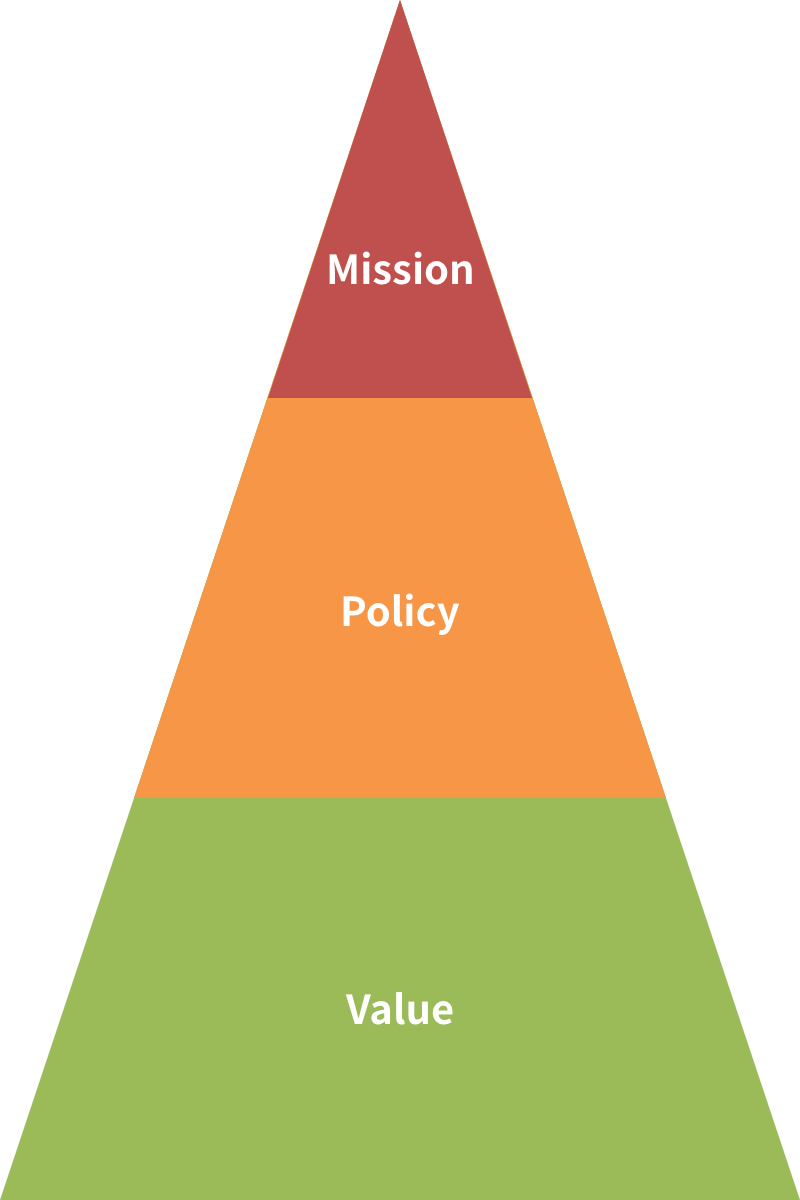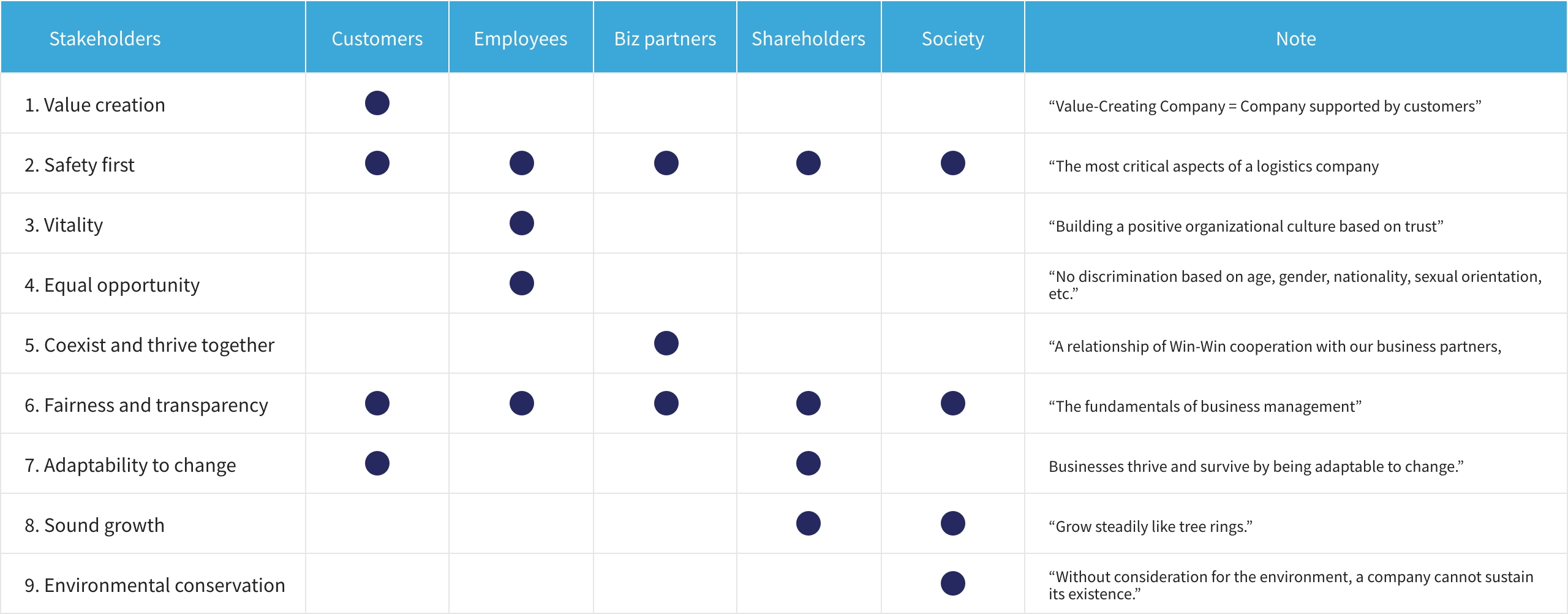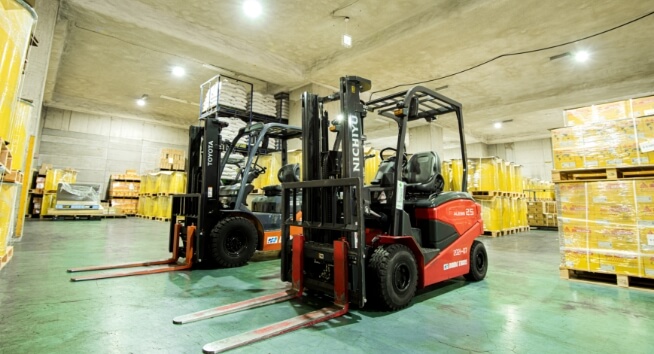Corporate Principle
Our corporate philosophy is composed of three elements: Mission, Management policy, and Core values.

Our corporate philosophy is composed of three elements: Mission, Management policy, and Core values.

Mission
“Mission” is a statement that represents the fundamental purpose of why a company exists and what business it conducts, as well as what mission it should fulfill (what value it provides to society). It serves as the foundation of the corporate philosophy and is essential for defining the company’s purpose.
Read morePolicy
“Management Policy” is a set of nine principles that represent the fundamental ideas for our management approach that we commit and implement for each of our stakeholders in order to fulfill our mission.
Read moreValue
“Core Values” represent the 16 behavioral standards that our employees working in the daily operations strive to practice at all times.
Read more
“Mission” is a statement that represents the fundamental purpose of why a company exists and what business it conducts, as well as what mission it should fulfill (what value it provides to society). It serves as the foundation of the corporate philosophy and is essential for defining the company’s purpose. While the term “purpose” is often used these days, our company refers to it as “mission”.


MISSION
“As a ‘Portal Company’ in the international logistics industry, we are committed to providing safe, reliable, and courteous services to earn the satisfaction and trust of our customers while actively contributing to the future of logistics and society. We will continue to be a company that all employees and their families can be proud of who are involved in pursuing this mission.”
“Portal Company” is a coined term derived from “portal site” (the gateway to the internet). “Portal” is a derivative of “port”, meaning entrance or gateway. We use the term “a portal company in international logistics “ to express our business area of connecting customers from Japan and abroad, starting from the port. We always keep in mind the basic principles of a logistics company, which are “safety, reliability, and courtesy”, and provide high-quality services that satisfy all our customers and earn the trust from them. We also use the word “future” to express our intention to continue to exist and contribute to society for years to come. By participating in the realization of this mission, our employees and their families can be proud of our company. As a result, we believe that the physical and mental well-being of our employees and their families can be achieved.
 Management Policy
Management Policy
“The Management Policy” is a set of nine principles that represent the fundamental ideas for our management approach that we commit and implement to each of our stakeholders in order to fulfill our mission.
Value creation:
We constantly strive for innovative ideas and utilize our superior assets and extensive network to provide high-quality services at reasonable prices that meet the needs of our customers.
Safety first:
As a logistics company, we prioritize safety and accident prevention by following the rules and regulations.
Vitality:
We respect the personality and diverse individuality of all employees and create an open and dynamic workplace based on mutual trust.
Equal opportunity:
We provide equal opportunities for learning, growth, and promotion to employees who are sincere, motivated, capable, and demonstrate their abilities.
Coexist and thrive together:
We establish appropriate relationships with our business partners and seek mutual prosperity.
Fairness and transparency:
We comply with the law and have a high ethical standard, and engage in fair and transparent business activities.
Adaptability to change:
We aspire to global management and constantly innovate, maintain a sense of urgency, and respond quickly to changes.
Sound growth:
We aim for balanced growth between short-term and long-term profits to become a sustainable company.
Environmental conservation:
We make efforts to efficiently use resources through activities such as resource conservation and conduct business activities that give sufficient consideration to the environment.

 Core Values
Core Values
The“Core Values” represent the 16 behavioral standards that our employees working in the daily operations strive to practice at all times. It was created through discussions among most of our employees, who shared their opinions and views. Although the number of guidelines may seem high, they represent the important values that we should share in our work. Rather than just memorizing and reciting the Core Values, we position it as a practical tool for becoming a successful business person who produces results. Each employee reflects on their behavior in light of the Core Values on a daily basis, which helps them with self-reflection and personal growth.
We treat everyone with politeness and respect, and approach everything with integrity and earnestness by putting ourselves in the other person’s shoes.
Although the 16 Core Values are not listed in order of importance, there is a reason why “integrity” is the first item on the list. It is the one standard that we hope everyone will practice. “integrity” is the bridge that connects one person’s heart to another. By approaching people with sincerity and standing in their shoes, we can build deep trust with them. We face each person and task with sincerity, and by doing so, others will empathize with our attitude, behavior, and way of life. As a result, we can become people who receive support from others.
We are aware of our roles and responsibilities and will proactively think and act on our own.
The first habit in Stephen Covey’s “The 7 Habits of Highly Effective People” is “Be Proactive.” Being proactive means taking an attitude of not relying on others or circumstances, but rather taking action based on our own will and judgment. Being proactive means choosing and creating our own life, and taking responsibility for our own life. This is also related to the principle of “self-accountability.” Let us not blame our environment or others, but do our best to control what we can.
We keep our perspective broad, strive for creativity and ingenuity, and continue to improve our work without being bound by precedent.
We want our employees to always have a sense of problem awareness, rather than being satisfied with the status quo. A problem is the gap between the current state and the ideal state, so being aware of problems means being conscious of this gap. We want them to be able to identify issues on their own. Keep asking themselves questions such as, “Can we make it easier?” “Can we make it faster?” “Can we make it more convenient?” “Can we make it more readable and understandable?” “Can we reduce costs?” “Can we make our colleagues happier?” “Can we make our customers happier?” By constantly striving for improvement and seeking the ideal state, we can develop our creativity and ingenuity.
We think about how we can do it, propose solutions, and take action rather than focusing on why we can’t do it.
There are often people who come up with countless reasons why something cannot be done, but in most cases, it is due to fixed ideas (thinking it is impossible), laziness (not bothering to research or think), or self-defensive instincts (not wanting to do it because they might get scolded if they fail), and other negative reasons. Even if something seems difficult, we should have a mindset that we can somehow do it, and by looking at things from different angles or consulting with others, we can often find a breakthrough.
We strive to do our best and achieve outstanding results beyond expectations without giving up easily.
In school exams, even if you don’t get a perfect score of 100, you can still pass with a score of 60 or 70. However, this is not the case in the workplace. There is no such thing as a satisfactory score, so everyone always needs to aim for a score of 100 or above and do their best. “Achieving results that exceed expectations” means delivering results that surprise people. Excessive quality is not desirable, but we want our employees to do work that makes customers and bosses think, “Oh, you did this much? You can do it?”
We have the motivation and determination to continue to tackle difficult challenges without fear of failure.
There is only one way to never fail, and that is to do nothing. However, by doing nothing, we won’t gain anything, and we won’t grow. If we are not careful, we could end up living a “life of failure.” So, if we think it’s for the best, we try doing it first. We won’t know until we try anything. The attitude of trying is what opens up the future. “If no one else is going to do it, I’ll show them how it’s done.” Let’s have this determination.
Enjoy working with colleagues, trust each other, share ideas, collaborate, and achieve results together.
The significance of working in a team is that 1+1 will be more than 2. We cannot live alone and there are tasks that cannot be accomplished alone. High-quality results are produced by strong teams based on trust. To achieve this, each person must increase their “trust balance” and become someone who can be trusted. Also, we do not forget to have respect and gratitude towards our teammates. There is no easy job, but if we have reliable colleagues, we can enjoy doing it.
Listen to others’ opinions, align vectors through frank discussions, and collaborate to achieve what has been decided.
Most organizational problems are communication problems. Many human relationship and work-related issues arise from not properly listening to others or speaking unnecessarily. While each team member must be independent as a professional, they must also be interdependent to work effectively, and the difference in results can be significant. Communication is the most important factor in achieving this. It is not easy to listen carefully to what others say, but people like those who listen to them. Also, when communicating, whether in writing or speech, it is essential to always consider the interests and expectations of the recipient.
Sharing important information, including mistakes and failures, enhances problem-solving abilities.
Humans are creatures who make mistakes and fail. The important thing is to think about and implement measures to prevent mistakes and failures, given that we operate under that premise. Nonetheless, mistakes and failures can still occur, and the crucial thing in those situations is recovery. How we handle the situation can make a significant difference. It is important to not hide inconvenient truths and to quickly and honestly convey what happened, so that everyone can work together to come up with the best solution. This ultimately saves both individuals and companies.
We value a humble attitude and a sense of reflection that acknowledges one’s own role in problems, rather than blaming others or external circumstances.
When things don’t go well, we tend to blame others and want to point fingers (blame-shifting). However, in many cases, the root cause is often within ourselves. When we point at someone and say “It’s your fault,” or “You’re to blame,” we are actually pointing one finger at them and the remaining fingers, except the thumb, are pointing back at ourselves. It’s easy to blame the boss, the subordinates, or the business environment, but often the cause is simply our own lack of ability or skills. When you feel the urge to blame someone, try pointing your finger at yourself. It’s the quickest path to problem-solving and personal growth.
We take every opportunity as a chance to learn, approach things with an open mind, strive for self-improvement, and aim to grow every day.
If asked what is the one essential quality that business leaders need, Konosuke Matsushita, the founder of Panasonic said it is “open-mindedness.” It is difficult to approach things with an open mind because people are always trapped by pride, prejudice, and self-interest, so they inevitably filter their thinking through those lenses. A person’s growth stops the moment they think they are right and the other person is wrong. Therefore, truly competent people, even if they disagree with their own ideas, will first accept the other person’s opinion with an open mind and say, “That could be possible.” This attitude can even turn the other person into a collaborator. Open-mindedness is a valuable asset.
We value time, eliminate waste, have a cost-conscious mindset, and enhance work productivity. To achieve this, we prioritize tasks based on their importance and urgency and focus on what needs to be done.
The low productivity in Japan is a significant issue. Large companies have an advantage in terms of resources such as people, materials, and money. However, time is the only resource that is equal for everyone. Each person has 24 hours a day, and how we use this time can entirely change the results of our work and our lives. In the matrix of importance and urgency, tasks that are both important and urgent will move forward without us doing anything. The challenge lies in tasks that are important but not urgent. This is often the fundamental challenge in both work and private life. Let us work on at least one or two tasks in this area and execute them systematically.
We strive to think about the purpose, repeat “why,” and make an effort to capture the essence of things and problems.
When you work, do you think about the “purpose” firmly? The purpose is “why” you do it. Without a purpose, it is not work. Also, do you understand the difference between purpose and goal? The purpose is “why,” and the goal is “what you aim for.” What are you working for? What are you aiming for in your work? I hope you will not just do superficial work, but think deeply and pursue the essence of the work. By doing so, you can approach the essence and reality, and I think you will find your work interesting.
Thoroughly organize and clean up the workplace environment through “sorting, setting in order, and cleaning”.
The 3S’s of sorting (Seiri), setting in order (Seiton) , and cleaning(Seiso), combined with cleanliness(Seiketsu) and discipline(Shitsuke), known as the 5S’s, are essential for all types of work. The purpose of this activity is not just to keep things clean. By eliminating unnecessary items and keeping only what is necessary, visualization is improved, waste is eliminated, and productivity and efficiency are increased. In addition, workplace safety is improved. “Sorting (Seiri)” means separating what is needed from what is not and discarding the unnecessary. “Setting in order (Seiton)” means arranging the necessary items in a way that they can be easily accessed when needed and assigning a designated location for each item.
We take care of our customers’ precious cargo, always ensuring its safety, reliability, and meticulous handling, and we never allow accidents to happen.
We are a logistics company with our own vehicles and warehouses, entrusted with the important cargo of our customers. The danger of accidents is always close at hand, and all employees must recognize that safety is our top priority.
We comply with laws and regulations, and uphold workplace rules and discipline, behaving as responsible members of society.
Disciplined organizations have an atmosphere of determination. Every member works together as a team towards achieving goals, understands their individual responsibilities, and has strong self-control to follow through with their decisions. Conversely, undisciplined organizations are the opposite. Failure to achieve goals is normalized, and individuals and teams are indifferent to it. Excuses are accepted, tardiness is common, deadlines are missed, phones ring off the hook, yet no one bothers to take action. Setting up detailed rules and regulations doesn’t create a disciplined organization. In fact, the opposite is true. Control means to regulate people’s behavior. In organizations lacking discipline, control increases and creates bureaucratic structures. If there is discipline, then control is unnecessary. The 16 core values can be seen as the means to realize a disciplined organization or workplace.
We have compiled some useful information about international logistics, so please feel free to make use of it.

We will introduce useful knowledge about international logistics.
Fun facts about international logistics.
We will guide you through our logistics services that are tailored to meet your needs.
Search by purpose.
Daido Trans-Planet, we are committed to initiatives related to the SDGs (Sustainable Development Goals).
